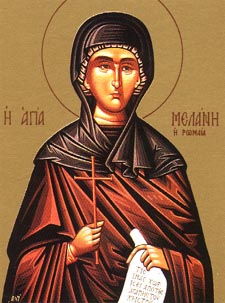|
|||
|---|---|---|---|
| This weekly bulletin insert complements the curriculum published by the Department of Christian Education of the Orthodox Church in America. This and many other Christian Education resources are available at http://dce.oca.org. | |||

Gifts, those we give and those we receive, are on our minds during the season of Christmas. One of the all-time great givers of gifts was Saint Melania of Rome. She used her immense wealth to give personal help to countless needy people, as well as supporting the institutions of the Church. Her gifts were gratefully accepted, especially because she gave them in humility, without any expectation of praise or special honor. But one story about Melania describes a time when her monetary gifts were not welcome. It happened at an Egyptian men's monastery she was visiting. Rich as she was, Melania chose not to live in luxury and ease. Yet even the simplicity of her life must have seemed lavish compared to what she saw in the monastery. She was amazed at the monks' life, making do with only the barest essentials and letting nothing of the world distract them from their constant attention to prayer. Melania soon understood that the men were unwilling to accept any money from her. But while paying a visit to one monk whose name was Ephestion, she saw that in his cell there was almost nothing--only a bit of bread and water, the mats he wove, and a salt pot. Determined to give him something, she hid a few gold coins in the salt pot, and went on her way. A few moments later, she heard the footsteps of someone running after her. It was Ephestion, clutching her coins in his hand and shouting, "I don't need this; it is yours so take it back!" Melania answered, "If you don't need it, surely you can give it to someone who does."
"No, no," the monk insisted. "Nobody around here would have any use for it." And with that, because Melania resisted taking them back, he flung the coins into the river and went back to his cell. Money was something that he and his brother monks didn't need. They didn't even want it, knowing the power of money to become a temptation to sin. It takes time and effort to know and discern what we need, because we don't all need the same things. The Church's prayers reflect this. In the Litany of Supplication, for example, the priest prays for us to be granted "all things that are good and profitable for our souls." Not that we be granted what we may want or think we need, not just things that will help us "keep up with" everyone else, but the things that truly are good and profitable for us. In a similar way, before he elevates the Gifts for Holy Communion, the priest asks God to distribute them "unto all of us, for good, according to the individual need of each." Many of us wouldn't throw a gift of gold coins into the nearest river. But if we work to discern what we really need, and trust God to give it, we can discard a lot of things that are just taking up space. |
|||
